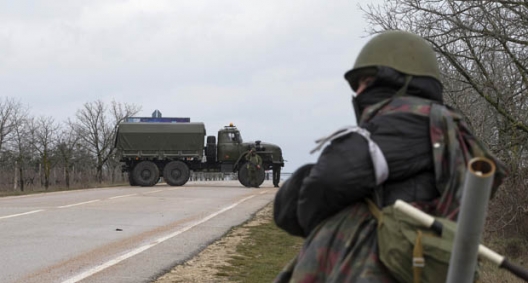 The fight over Ukraine – whether it will align with the European Union or with Russia – took a worrisome turn last night when unidentified camouflage-uniformed troops seized two strategic airports in Ukraine’s Crimean Peninsula on the Black Sea. While Russian military officials issued denials of any responsibility, Atlantic Council analysts and others say Russia appears to be intervening in Crimea in a move with parallels to its 2008 invasion of two regions in nearby Georgia.
The fight over Ukraine – whether it will align with the European Union or with Russia – took a worrisome turn last night when unidentified camouflage-uniformed troops seized two strategic airports in Ukraine’s Crimean Peninsula on the Black Sea. While Russian military officials issued denials of any responsibility, Atlantic Council analysts and others say Russia appears to be intervening in Crimea in a move with parallels to its 2008 invasion of two regions in nearby Georgia.
The United States has warned Russia against taking military action in Ukraine over the collapse last week of its relatively pro-Russian government under President Viktor Yanukovych. A Russian military strike into Ukraine – perhaps to recover Crimea, which it ruled from the 18th to the 20th centuries – would cause the deepest disruption to US-Russian relations since the end of the Cold War.
Related Content
|
Infantrymen seized the airports at Sevastopol, the port city and main Russian naval base on the Black Sea, and at Simferopol, the Crimean regional capital. Ethnic Russians and indigenous ethnic Tatars clashed in Simferopol this week over Russians’ demands that Crimea secede from Ukraine. In Kyiv, the new Ukrainian interior minister, Arsen Avakov, said the troops are Russian. The Crimea standoff arose after Ukrainians’ street demonstrations in Kyiv forced the ouster of President Yanukovych and his replacement by a more nationalist coalition that aims to steer Ukraine closer to Western Europe and away from Russia’s sphere of influence.
In any military intervention, “Russia can claim that as it does not recognize authorities in Kyiv, and as power in Ukraine is unclear, it is responding simply to requests to protect the people of Crimea from chaos and to protect the security of its own bases, secure weapons caches, etc.,” said Atlantic Council Senior Fellow Adrian Karatnycky. With the turmoil this week in Crimea, Russia may argue that it cannot “countenance armed right wing gangs and radical Muslim Tatars seizing weapons caches, commandeering government buildings, … threatening public order and so the Russian military and their families,” said Karatnycky, a longtime researcher and author on the former Soviet Union and a former president of Freedom House.
Another longtime analyst of the former Soviet Union, Paul Goble, notes this morning the observations of the prominent Moscow political commentator, Leonid Radzikhovsky, writing in Nezavisimaya Gazeta.
In an article titled “Putin’s Crimean Plan,” Radzikhovsky posits that Russian President Vladimir Putin will feel in a position to arrange a Crimean referendum to call for secession from Ukraine and independence. As a preliminary a “group of unknown gunmen” need only seize the Crimean parliament and force it to call the plebiscite, Radzikhovsky writes.
Both Karatnycky and Radzikhovsky note that Russia now may use ousted President Viktor Yanukovych, whom Moscow declares is still legally the Ukrainian head of state, to provide a fig leaf of legal cover for such an intervention.
As Ukrainian legislators named an interim, coalition government this week to replace Yanukovych, the Atlantic Council’s Damon Wilson urged them to give greater attention to inclusive governing, including the sensitivities of the ethnic Russians in eastern and southern Ukraine. As this morning’s developments unfold, we will see whether a Russian military intervention is now aiming to deprive them of that chance in Crimea.
James Rupert is managing editor at the Atlantic Council.
Image: Soldiers bearing no insignia or identification guard the road leading to Belbek Airport in Crimea February 28, 2014 (Photo: REUTERS/Baz Ratner)

